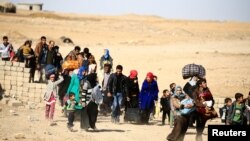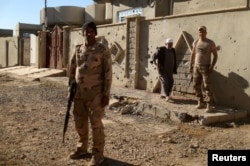The increasing likelihood Islamic State terror group fighters battling to retain control of the key Iraqi city of Mosul will start relying on chemical weapons is adding to fears of a humanitarian catastrophe.
Hundreds of thousands of civilians are believed to be trapped inside Mosul, even as Iraqi forces have begun to clear neighborhoods in the city's east. And while those forces carry some protections against chemical weapons, little has been done to protect residents caught in the cross hairs.
“There's a real risk,” warned Human Rights Watch senior Iraq researcher Belkis Wille, who recently returned from the country.
“Neither the Iraqi forces nor the Americans, nor the humanitarians, for that matter, are publicly putting out any information to the communities about what to do in the case of an attack,” she said.
And she fears it is not just information that is lacking. Equipment critical for surviving potential chemical attacks also appears to be in short supply.
“I haven't seen a single instance where they're actually bringing forward equipment, gas masks, et cetera, to try to have them placed in the case of these attacks to be available to civilians," she said.
Shells, rockets
For the most part, U.S. military and intelligence officials have described IS's chemical weapons arsenal as "crude." They say much of it relies on chlorine gas or sulfur mustard, in powdered form, which is added to artillery shells and rockets.
Upon impact, the sulfur mustard can form dust clouds that cause irritation, which Pentagon officials admit can be lethal in large doses.
For human rights workers and aid groups, there are concerns the effect could be magnified in a dense urban environment.
Already, a series of IS chemical attacks near Qayyara, south of Mosul, in September and October injured seven people, all of whom suffered painful burns and blistering after low-level exposure to sulfur mustard.
Weapons produced in Mosul
A new analysis by IHS Conflict Monitor predicts the use of similar chemical weapons in Mosul, which served as a center for IS's chemical weapons production, is all but certain.
"There is a high risk of the group using chemical weapons to slow down and demoralize advancing enemy forces, and to potentially make an example of — and take revenge on — civilian dissidents within the city,” IHS Conflict Monitor Senior Analyst Columb Strack said in a release.
The IHS study found IS has already used chemical weapons 52 times in Iraq and Syria over the past two years, with 19 of the attacks taking place in areas around Mosul.
The study also concluded there is a risk IS could try to detonate a so-called "dirty bomb," spreading radioactive material using low-grade nuclear material its fighters took from the University of Mosul.
"Comments made by Islamic State supporters suggest that members have at least thought about the idea," according to Karl Dewey, a chemical and biological weapons analyst at IHS Jane's.
U.S. aware of dangers
U.S. officials, aware of the dangers, said even before the campaign started that "prudent, preventive measures" were underway to reduce the risk.
"U.S. and coalition forces have placed a high priority on targeting ISIL's chemical weapons and capabilities to produce or use chemical weapons," a senior administration official said this month. "We've tried to destroy as much as we could in advance."


